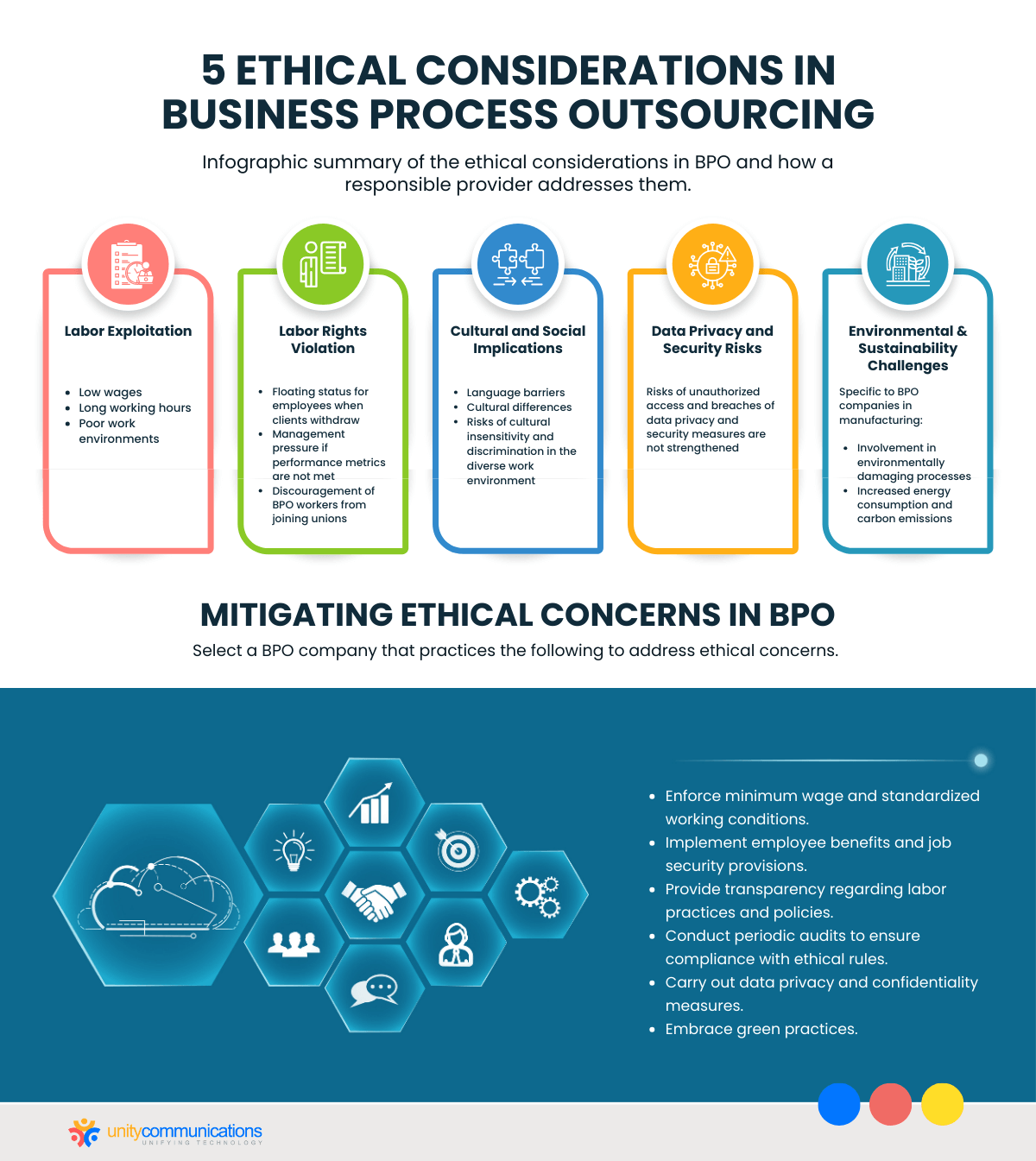IN THIS ARTICLE
Table of Contents
With every milestone, controversies and challenges lurk to impede your progress. The same goes for the business process outsourcing (BPO) industry.
Although the sector has significantly expanded through the years, with a projected compound annual growth rate (CAGR) of over 9% by 2030, specific issues linger. Ethical considerations in BPO, such as those related to the fair treatment of workers, are among the most notable concerns in this field.
Fortunately, practical ways exist to guide service providers in addressing such issues. Let us discuss each of them below.
Noting the Ethical Considerations in BPO

You usually encounter the words “fast third-party support,” “cost efficiency,” and “streamlined operations” when exploring the concepts behind what BPO is. However, note that this practice involves much more than getting work done effectively and at a lower cost.
While the BPO impact of small businesses and large enterprises alike is significant, particularly in their seamless operations, providers and clients both must be mindful of the people behind the scenes. These are the workers who dedicate their effort and time to drive the global outsourcing market’s constant growth, helping to achieve a projected CAGR of more than 9% until 2030.
To support the professionals responsible for the sector’s consistent growth, you must recognize the ethical considerations in BPO. Addressing these concerns is right; it also brings long-term BPO advantages for providers and clients.
Let us start by detailing each concern.
- Labor exploitation. While it is true that outsourcing offers clients superior service quality at an affordable price, BPO workers often experience low wages, long hours, and poor work environments. Ethical concerns emerge when service providers prioritize cost reduction at the expense of fair compensation and work-life balance.
- Labor rights violation. Some BPO workers encounter a violation of labor rights. In the Philippines, some BPO companies put their employees on floating status when clients withdraw and manage them if they cannot meet performance metrics. Cases of discouraging BPO workers from joining unions also happen.
- Cultural and social implications. BPO entails working with service vendors from different countries, resulting in language barriers and cultural differences. Cultural insensitivity and discrimination might occur in this diverse work environment.
- Data privacy and security risks. BPO transactions involve handling sensitive data. Service providers who fail to strengthen data privacy and security put customer information at risk of unauthorized access and breaches.
- Environmental and sustainability challenges. BPO companies specializing in manufacturing might participate in environmentally damaging processes, such as increased energy consumption and carbon emissions. These factors contribute to environmental degradation and climate change when they neglect sustainable practices.
Mitigating Ethical Concerns in BPO
Do not feel discouraged after reading the above ethical considerations in BPO. Yes, such BPO challenges happen in reality. But the ethics of outsourcing practices prevail to ensure providers, client organizations, and consumers remain protected against all odds. Providers must follow common guidelines to prevent or mitigate ethical concerns:
- Enforce minimum wage and standardized working conditions. BPO workers should receive fair compensation while working during reasonable business hours.
- Implement employee benefits and job security provisions. BPO workers have personal needs and normal lives; they need compensation that matches their hard work.
- Provide transparency regarding labor practices and policies. Service providers must be upfront and transparent regarding their work strategies and rules. Transparency builds trust for BPO companies and clients that sign service-level agreements (SLAs).
- Conduct periodic audits to ensure compliance with ethical rules. This action certifies that providers impose stringent standards to meet the sector’s moral code.
- Carry out data privacy and confidentiality measures. Reliable service vendors implement strict security policies and procedures to protect sensitive data. They use virtual private networks (VPN), password-protected systems, firewall-protected networks, and network-encrypted servers to ensure safe remote operations.
- Embrace green practices. Similar to companies in other industries, BPO providers roll out eco-friendly initiatives to address sustainability challenges. They encourage remote or hybrid work setups to lessen energy consumption. Manufacturing-focused vendors also use clean energy systems to help reduce carbon emissions.
Ensuring Fair Treatment of BPO Workers

The fair treatment represents each worker’s inherent value and worth. When companies treat professionals equally, it boosts job satisfaction. It translates into increased morale and motivation.
This ethical standard establishes a positive workplace where workers feel valued and respected, driving higher productivity, engagement, and loyalty. Hence, providers should take these steps to ensure fair treatment of their workers.
- Implement fair employment practices. Providers must treat their employees respectfully and justly, regardless of their BPO roles and responsibilities. They should also provide equal opportunities to help workers grow and succeed.
- Provide training and skill development programs. Third-party experts need access to continuous learning initiatives that help improve their skills. Investing in professional development empowers workers to achieve their full potential.
- Encourage employee engagement. BPO companies should make their workers feel heard, valued, and motivated by encouraging them to provide feedback. After all, employee insights and experiences bring significant perspectives to enhance daily operations.
- Promote work-life balance and employee well-being. BPO workers experience demanding schedules and high-pressure conditions. Thus, service vendors must host programs and provide leave incentives to help maintain physical and mental well-being.
- Strengthen employee representation and participation. Providers should let workers form or join labor unions to advocate for fair treatment and protect their rights. Enabling this freedom encourages employees to voice their concerns about their working conditions.
- Establish grievance mechanisms and dispute resolution processes. Service providers must implement a practical method to let employees express their concerns. Enforcing a system helps resolve conflicts fairly and impartially, creating a workplace culture of trust and accountability.
The Bottom Line

Employees are crucial to the BPO sector’s continued growth. However, they cannot prevent certain instances that violate their rights and welfare in the workplace. Data security and environmental sustainability issues also prevent providers from maintaining healthy operating conditions.
Addressing ethical considerations in BPO helps set up a safe and reliable work environment for third-party workers. Fair treatment of workers upholds human rights and empowers them to maintain exemplary performance. This ethical responsibility builds trust between employees and employers, boosting efficiency and ensuring consistent enterprise growth.
Are you looking for an ethical BPO partner? Let’s connect and discuss a potential agreement. Unity Communications implements ethical practices and maintains high-quality standards while providing cost-effective support services. The award-winning provider also employs well-trained employees and robust solutions to meet your daily operational requirements.





